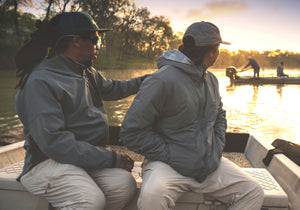At Orvis UK, protecting the waters we love to fish isn’t just a passion, it’s a responsibility. That’s why we continue to support the Angling Trust’s Water Quality Monitoring Network (WQMN), a growing citizen science initiative helping to uncover the true state of our rivers, lakes, and now estuaries.
With August often recognised internationally as Water Quality Monitoring Month, it’s a fitting time to reflect on the work being done across the UK to protect our rivers and estuaries and to highlight the vital role anglers play in that effort.
This month, we’re sharing the latest findings from the WQMN’s Spring 2025 Report, which received widespread media coverage, and celebrating the launch of their new Estuary Water Quality Monitoring Network – a major step forward in monitoring water quality from source to sea.
Spring 2025: A Wake-Up Call for Our Rivers
The Angling Trust’s Spring 2025 report gained national media attention in The Independent, The Times, BBC South East, and others. The findings paint a clear and concerning picture of the pressures facing our freshwater ecosystems.
Key findings include:
-
Hottest Spring on Record
Spring 2025 was officially the hottest in the UK since records began in 1884. Combined with unusually low rainfall, these conditions created ideal circumstances for pollutants to build up in rivers. -
Sharp Rise in Nitrate Pollution
Over 53% of water samples contained nitrate levels above 5ppm, a threshold known to fuel harmful algal blooms. Even more concerning, 6.4% of tests exceeded 11.3ppm — nearly three times the breach rate recorded in 2023. -
Increased Ammonia Concentrations
Toxic ammonia pollution also reached record highs. In spring 2025, 5.4% of tests failed to meet good ecological standards, up from 2.2% in 2023. Warmer water temperatures amplify ammonia’s toxicity, posing a heightened risk to aquatic life. -
Rising Electrical Conductivity
Mean electrical conductivity — a general indicator of pollution levels — was 17% higher than in 2024 and 33% higher than in 2023, suggesting a growing burden of dissolved pollutants during dry, warm conditions.
These findings are not just statistics, they’re a clear signal that more must be done to protect our waterways, and that the work of volunteers monitoring these changes is more important than ever.
Expanding the Network: Monitoring Estuaries Nationwide
In positive news, the Angling Trust has launched a new Estuary Water Quality Monitoring Network, extending its campaign beyond rivers to include our vital coastal waters. We were lucky enough to have some members of the Angling Trust team attend our Orvis Saltwater Fly Fishing in June to discuss this new project.
Following a successful pilot on the Ribble Estuary, the project launched publicly in May and received enthusiastic support from both the angling community and government bodies. Seven estuaries are already being monitored by trained volunteers, with more joining the network each month.
Thanks to funding from the Marine Management Organisation, new volunteers can access partial funding for their water testing kits. This is a unique opportunity to get involved and help gather meaningful data about the state of our estuaries – ecosystems that are crucial for both biodiversity and recreational fishing.
To learn more or sign up, visit The Angling Trust.
How You Can Help
This month, there are plenty of ways to take action:
- Join your local river or estuary monitoring team
- Report pollution incidents using the Angling Trust’s tools
- Raise awareness within your community or on social media
- Contact your MP to demand stronger protections for waterways
- Support campaigns like Anglers Against Pollution and help grow the pressure for change
At Orvis UK, we believe anglers have always been some of our most committed guardians of the waterways. We're proud to support the WQMN and to play our part in protecting the wild, fishable waters that define our sport and our connection to the natural world.


